Updated 20 January 2025.
This is an opinion/prediction piece
Economic and political winds favourable for Smith
Danielle Smith has enjoyed a highly favourable economic backdrop in her first 27 months of her premiership. Oil prices have ranged from a monthly average price of $U.S. 69.95 in November 2024 to a monthly high average price of $85.64 in April 2024 (Cushing, OK WTI Spot Price FOB). This favourable oil price environment has assisted Smith greatly on the fiscal side. In preparing for the May 2023 election, the province’s books were in surplus by a whopping $11.6-billion and the fiscal 2024-25 fiscal year surplus is estimated to be $4.6-billion. The surplus could go much higher with the weakness in the CAD. From October 2022 to December 2024, Alberta’s labour force grew from 2,532,600 to 2,790,200 although the unemployment rate rose slightly from 5.4 per cent to 5.5 per cent (seasonally adjusted basis). Housing starts have also increased significantly as Alberta’s population has grown the fastest in Canada over the past three years.
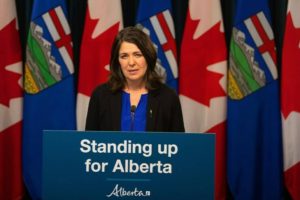
ATB Economics has attributed some of the increase in population growth to the difference in housing prices between Alberta and Ontario and British Columbia. Other factors including growth of employment in oil and gas, Alberta’s lower tax environment as well as major construction projects in Alberta, including the government subsidized Dow chemicals expansion and Air Liquide in the Edmonton area.
While the economic trade winds have been favourable to Smith’s government, the growing dislike of Justin Trudeau and his federal Liberal Party has also provided aided her Free Alberta Strategy. Smith and her predecessor Jason Kenney have invested in the fight against the Impact Assessment Act and despite an favourable ruling are back challenging amendments which “lands Ottawa in court again.” In addition, the government intervened in federal legislation to reduce plastic pollution and were also successful at the Federal Court level.
Danielle Smith and Rebecca Schulz, Alberta’s environment minister have also teamed up to attack Trudeau and his Environment Minister Stephen Guilbeault particularly after the May 2023 provincial general election. These attacks did much to win over the party base which was essential for her strong showing at the party’s AGM last November.
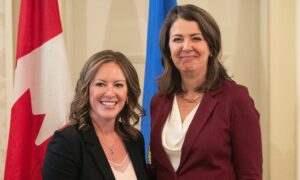
Introducing Trump 2.0
With Donald Trump set to be the 47th President of the United States on 2 January, there have not only been threats against Canada but other nations such as Mexico and China. He has also “trolled” Canada with language such “51st” state and “Governor.” I initially found his remarks not a joke but a deliberate insult and a venal attempt to undermine Canada’s unity. And what has happened since Trudeau’s Mar-a-largo dinner? Canada threw Mexico under the bus in November but now is walking this back. This reactionary move must have brought a smile to the incoming president. Divide and conquer is one of the oldest rules in the playbook. But also this trolling has divided Canada, perhaps irreparably.
Soon after these threats Canada “abandoned” Mexico. Trudeau’s delinquent resignation has effectively produced a lame duck national leadership. This has encouraged some premiers to take on a U.S.- Canadian relations diplomacy role. Quickly historic clashes financial and economic interests between the manufacturing province of Ontario and Alberta’s oil and gas industry surfaced.
In spite of Alberta’s and Canada’s well understood over-reliance on selling cheap oil, mostly discounted bitumen, to the United States, Alberta kept expanding high-emissions bitumen production. Much of the impetus for this goes back to Stephen Harper’s time in office with the boast of being a new energy super-power. A key part of this objective was sanctioned by the ludicrous claim that Canada’s high emissions oil was “ethical.” America and American oil refineries now rely on Canada for over 50 per cent of its oil imports up from 33 per cent in 2013. This increase is virtually all related to heavy oils and bitumen.
An evolving partnership…but not with Canada
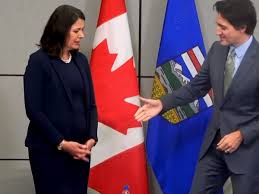
On 6 January 2025 Premier Smith announced plans to double Alberta’s oil production. This remarkably brash announcement and news conference with the CEO of Enbridge was another shot across the bow of Trudeau and Environment Minister Guilbeault. The statement began:
Alberta is a strong partner to the United States, currently delivering more than 4.3 million barrels per day to the U.S. The province is committed to increasing Alberta’s crude oil production and preserving and adding pipeline capacity, supporting North American energy security as well as enabling increased U.S. production (emphasis added).
The statement did not mention Canada at all. The federal government has jurisdiction over foreign affairs, but Smith is following her own goals to strengthen bonds with the United States. Her “short meeting” with Trump at Mar-a-Lago on January 11th, facilitated by entrepreneur Kevin O’Leary, supports her goal of bonding with the U.S.
On the federal-provincial relations front, Premier Smith reacted negatively to Foreign Minister Melanie Joly’s view that “everything (including oil and gas) was on the table.” Ms. Smith has made it very clear that oil and gas flowing to the U.S. market is not to be interrupted. Indeed, if Alberta’s free hand on moving oil and fossil gas to the U.S. is thwarted by Ottawa, Smith stated we have a “national unity crisis.” Ms. Smith has drawn a very clear line in the sand.
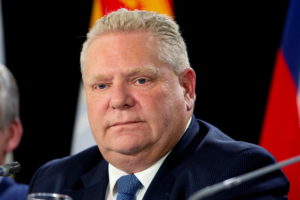
This unity crisis broke up into the open at a 15 January 2025 press conference with the Ontario premier, arguing the need for unity with no geographical or industry exemptions. Ms. Smith, who attended the 15 January meeting virtually, would not sign on to the communique issued at the end of the meeting and did not attend the press conference. Instead, she issued a statement reaffirming the Alberta government’s position that “Alberta will simply not agree to export tariffs on our energy or other products, nor do we support a ban on exports of these same products.” She also highlighted her ongoing diplomatic efforts in Washington at next week’s inauguration as well as future trips:
“to meet with U.S. lawmakers and officials to continue to make the case against the imposition of tariffs on Canadian products and to strengthen and grow the trading relationship between our two great and independent nations” (emphasis added).
Reading this, one wonders whether the reference to “two great and independent nations” is a reference to Alberta and the U.S.!
More fuel was thrown on the fire with Alberta media personality Don Braid’s incendiary column “Smith has plan to stop feds from looting Alberta to pay for tariff crisis.” Braid, who seems to have unrestricted access to Alberta ministers and government officials, described Smith’s plan to inoculate Alberta’s oil and fossil gas from federal incursion by effectively nationalizing the oil and gas industry. By this tactic, Alberta constitutional lawyers believe that a nationalized (provincialized) Alberta oil and gas would be immune from taxes. Section 125 of the Constitution Act states that no government can tax lands or property of another government.
Correction– Nationalize or provincialize may not be the best description in that this implies the Alberta government buying the Big Four companies and conventional companies. What the government could do is buy the product from the companies at the border making the product a p[roperty owned by the provincial Crown and then receive the proceeds from importers, with proceeds paid to the companies.
Braid and the Edmonton Journal’s David Staples are key spreading of the UCP gospel. In a recent column Staples suggested that Mark Carney’s allegiance to Canada was questionable.
How might this national unity crisis play out?
What does a national unity crisis look like from Alberta’s point of view?
Alberta’s problem, as diagnosed by Smith in a 2021 paper for the School of Public Policy (SPP) is not economic diversification, it is fiscal diversification. All Albertans with any interest in public finance know this. Nonrenewable Resource Revenue (NARR) represents about 25 per cent of total government revenues based on the province’s Mid-year Fiscal Update. Of the NRRR, bitumen royalties constitute three quarters of that revenue source. Over the past decade major players like Shell and Total have sold their oilsands interests with the result that only four oilsands producers pay roughly 20 per cent of Alberta’s total revenue.
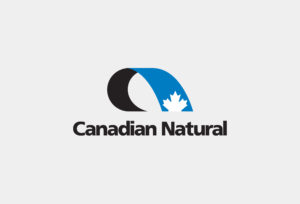
And who owns the Big Four? They are U.S. “institutions.”
However, in spite of her considered 2021 SPP piece, Smith has accepted the status quo, which Ted Morton labled “crack cocaine” in his political memoir Strong & Free. Indeed, this month she has doubled down on this addiction by advocating for an reckless and implausible doubling of oil and gas production.
20 January 2025
On 20 January the world will find out what Trump’s initial tariff threats will look like. Assuming Smith is correct, Trump will proceed with a 25 per cent blanket tariff on all goods exported by Canada.
Liberal leadership
With the Liberal party in a leadership race essentially a two-person race and Parliament prorogued until the end of March, the policy positions on dealing with Trump 2.0 of Carney and Freeland become key. Not only are the policy position on Trump important but so too are those relating specifically to energy and the environment.
In the Jon Stuart interview with Mark Carney, the Liberal aspirant noted that the “vast majority” of emissions come from industry, specifically 30 per cent of emissions come from the oil and gas industry. This fact and not wanting to change consumer behaviour through a broad-based carbon tax, is what Carney will focus on. This is a clear challenge for Alberta’s Smith who has dismissed any effort to bring down emissions, except where public funds can support carbon capture. At this stage we do not know whether Carney supports a carbon capture response or a tax on the wealthy whose carbon footprints are multiples of lower income workers, and directly on the Big Four.
As for Chrystia Freeland when she was in cabinet, she supported the generous tax incentives for carbon capture. Perhaps she will change her mind, but I doubt it.
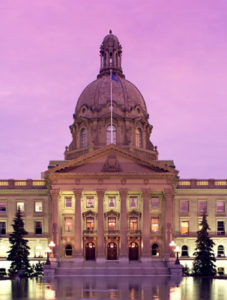
The Alberta Legislative Assembly only gets back to work on 25 February. This means that Smith and her cabinet will have free rein to respond to perceived threats from the federal government and other provincial governments. Unlike Trudeau’s continuing involvement in cabinet government undermines the legitimacy of the federal government, Smith will be able to rev up her political base. Continuing attacks on Ottawa, aided and abetted by Postmedia pundits, will reinforce the red line which Ottawa will be loathe to cross.
The worst case scenario of Ottawa placing an export tax on Alberta oil and gas will invariably drive separatist sentiment. Expect more commentary from the Calgary School whose Moment of Truth book (Mintz, Morton, and Flanagan) is a recipe as its provocative cover illustrates options such as Go it alone, 51st state, Let them freeze, rollover or build a firewall. Expect the case to be made that Alberta is a fiscally sustainable state given its current fiscal situation and the large balance of payments surplus with the only trading partner of relevance- the United States.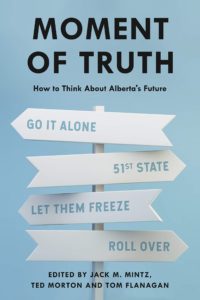
This is why Ms. Smith has apparently given up on the other provinces and the federal government as the pull of the U.S. of A is too important than trade and other ties with the Rest of Canada. This allegiance is clear from her recent press release on her trip to Washington. There she will court representatives, senators, governors, and the oil industry adding to her Rolodex of key American allies.
While in the U.S. capital from Jan. 18 to 23, Premier Smith will meet with key decision makers, governors, members of Congress and private sector leaders. Alberta’s on-the-ground presence will help build relationships and start critical conversations that will lay the groundwork for collaboration with the new U.S. administration and reap benefits for Albertans, Canadians and Americans.
“Given the serious threats of tariffs, it is imperative that we do everything we can to engage directly with the incoming administration, members of Congress and key officials to emphasize Alberta’s critical role in North American energy security and economic prosperity. In all my meetings and events in Washington, D.C. I will work to ensure Alberta is recognized as a partner of choice for establishing North American energy security, to reinforce our century-long friendship and to further solidify our trade relationship that greatly benefits both Americans and Canadians.”
Assuming Smith nurtures the 51st state option at these meetings, which is not farfetched given the preceding, she may be readying her bureaucracy, sworn to secrecy, to prepare for a possible referendum under the Referendum Act which would propose a question about joining the United States as the 51st state. Financial and economic studies will be prepared to show how viable an option becoming the 51st state, including Alberta’s improving credit rating. Political positives stressed will be no more equalization, lower taxes, and representation which gives legislators real power to support the economy of the new state.
Perhaps speculatively, the Alberta Pension Plan was a dress rehearsal on how to build a campaign that attempted to divorce Albertan pensioners from their national government. 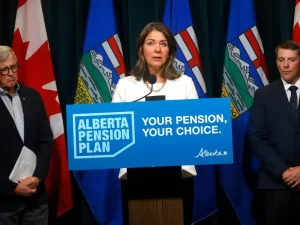
Nenshi as nation’s defender
If such a scenario unfolds, we could see in the coming year a starring role by Naheed Nenshi who has come out swinging at Smith’s failure to join the national consensus. In a fundraising message to NDP members Nenshi said “It’s time for us to fight for Canada,” noting Jason Kenney and Stephen Harper were supporting a united front.
A recent Abacus poll found that the greatest support for the idea of Canada joining the U.S. was highest in Alberta with 18 per cent. Again, the parallels between APP and 51st state are suggestive.
If such a scenario occurs in the not too different future, Ms. Smith’s frequent trips to oil and gas conferences, governors’ meetings, and the Washington circuit should feature prominently when examining this enterprise. What did Smith actually say in these backroom meet and greet discussions?
Bottom Line
Trump realizes that Canada as a nation is extremely vulnerable. Canada is now divided and weaker as a result. The next 48 hours will be pivotal to Canada’s future. And is Canada’s tariff bite, more bark, than bite?
On a somewhat related note
According to The Globe and Mail, four big Canadian banks, T-D Bank, National Bank, CIBC, and Bank of Montreal have quit the Net-Zero banking alliance. Four of the majors quickly followed the rush of American big banks out of climate change-related associations. This is homage to Trump and a bird to Mark Carney. Clearly the Canadian banks are fearful of Trump. Perhaps the Royal Bank and the Bank of Nova Scotia will support Canadian climate aspirations, such as they are.
Related Posts
Alberta’s Public Accounts Committee- Thoughts on Accountability and Public Service Neutrality
The State of Democracy in Alberta- A conversation with Jared Wesley